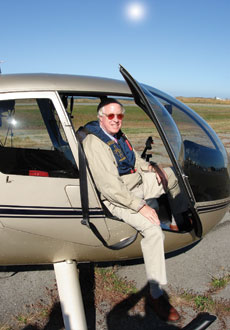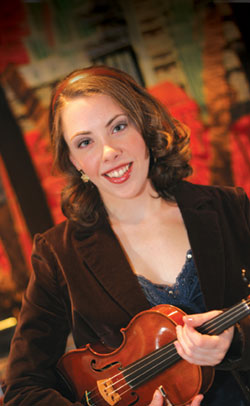Newsbites (page 3)
The flying physician

In the mid-1970s, a third-year McGill medical student took a break from his studies to visit his parents in Virginia. While there, he happened to tour Tangier Island in the middle of Chesapeake Bay, a community so isolated that its 600 residents still speak the Elizabethan English of their 17th-century founders.
The visit made a lasting impression on David Nichols, MSc’72, MDCM’76 — so much so that, when he later started his own family medicine practice, he offered to make weekly house calls to the tiny island.
Twenty-seven years later, his ongoing dedication to the islanders earned him the Country Doctor of the Year award, an honour bestowed by AMN Healthcare, the largest health care staffing company in the U.S. Every Thursday, and alternating Mondays, Nichols flies his Robinson R44 Raven helicopter to Tangier Island. He’s very serious about not missing a visit, even on days when poor weather forces him to trade his half-hour flight for a four-hour boat ride. “Once you start, you have to keep being there for them,” he explains. “People depend on you. The island is isolated, it’s rural, and it’s in desperate need of health care.”
During his Tangier visits, Nichols does everything from setting broken bones to performing colonoscopies, but much of his time is spent treating coronary disease. Linguistic anachronism isn’t the only peculiarity unique to Tangier: The islanders are susceptible to an extremely rare genetic condition that results in almost absent levels of high-density lipoprotein cholesterol. As a result, Tangier residents run a high risk of suffering heart attacks in their 30s and 40s.
Nichols professes “nothing but the best feelings for my years at McGill”—and not just because that’s when he met his wife, Dianne, BN’73. Studying under professors such as Dr. Ed Monaghan, MSc’61, DipSurgery’63, profoundly shaped him as a doctor.
“My McGill education taught me that 70 per cent of diagnosis is history. I remember when Dr. Monaghan would ask students to evaluate a problem, if you responded by asking, ‘Well, does the patient have this and that symptom,’ he’d say, ‘No! History, history, history! It’s the first thing you’ve got to do.’ The ability to ask questions and extract information is incredibly important. So is making [patients] feel like you’re not in a hurry.
“One thing they’ll tell you on Tangier is that I’m not a 10-minute doctor,” he adds. “And I can definitely thank McGill for that.”
this fiddler goes for baroque
Eight years ago, violinist Sarah Burnell found herself at a crossroads. Despite her talent, her passion for her instrument had waned and she was considering laying down her bow. It was the musical equivalent of a mid-life crisis — and Burnell was only 10 years old. Recognizing that her young charge was bored by Beethoven and being lulled to sleep by Brahms, Burnell’s teacher, Nancy Eadie, added a pinch of Celtic fiddle tunes to the Ottawa girl’s regular diet of classical pieces. The recipe proved to be the perfect antidote to Burnell’s ennui.
Now a first-year Violin and Music Education student in McGill’s Schulich School of Music, Burnell effortlessly straddles the classical and Celtic worlds. Last November she was an orchestra member for Opera McGill’s production of Dido and Aeneas. Three weeks later, she was in Edmonton to pick up her prize as Young Performer of the Year at the Canadian Folk Music Awards.

“Fiddling was supposed to be put on the backburner once I started at McGill,” she laughs, “but apparently that won’t be happening.” Instead, she’ll happily continue her melodious balancing act. Between classes and six hours of Baroque practice a week, Burnell plans to return to the studio later this year to record the follow-up to her first CD, Sarah’ndipity.
Burnell isn’t conflicted about working in seemingly disparate genres. She savours the technical challenges presented by classical violin, while feeding off the intimate exchanges between Celtic fiddler and audience. “In the end,” she says, “Baroque has helped my fiddling and fiddling has helped my Baroque.”


